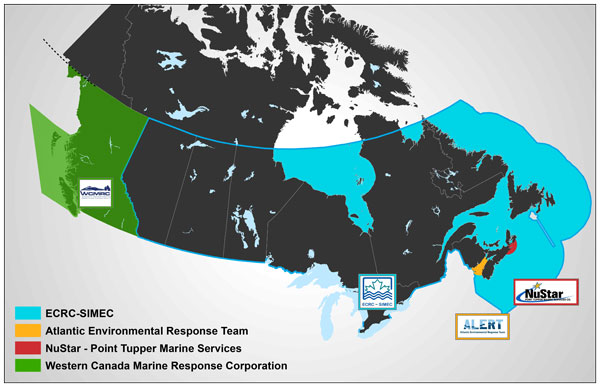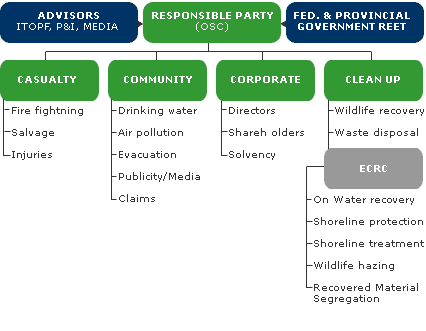

In 1993, amendments were made to the Canada Shipping Act (CSA) to strengthen Canada’s marine oil spill response capability. The amendments required:
Canada’s private sector established four response organizations within Canada to meet the requirements of the CSA and to provide marine oil spill response services.
A RO is defined in the Canada Shipping Act (CSA) as a person or body who is certified by the Minister in respect of any geographic area and in respect of a specified quantity of oil. The certification is dependent on the receipt and approval by the Minister of a response plan that conforms to regulations respecting the procedures, equipment and resources that will be used by the RO for a spill of a specified quantity of oil within its geographic area.
A certified RO has two roles.
An arrangement is the right given by a RO to a ship or oil-handing facility so that it can identify (for purposes of its oil pollution emergency plan) it as the RO with which the ship or oil-handing facility has the arrangement.
Marine oil spill response services means the provision of equipment, personnel and operational management, for the containment, recovery and clean-up of oil spilled on or into water or spilled on water in connection with the loading or unloading of oil from ships and also includes preventative measures. It does not include acting as the On-Scene Commander, lightering of distressed vessels or involvement in third party damage claims or adjustments. This following document has been developed to provide interested parties with an overview of Canada’s Response Organizations. Response Organizations Overview 
A response is normally characterized by the emergence of four critical challenges. They are Casualty, Community, Corporate, and Clean Up. The Responsible Party (RP) is responsible for the management of these four critical challenges and in Canada, in ECRC’s geographic area of response, the RP can look to ECRC to handle most of the Clean-up activities.
The following diagram demonstrates the relationship that exists between the Responsible Party (RP) and the Response Organization.

ECRC’s Spill Management System (SMS) provides ECRC’s Spill Management Team (SMT) with a a structure to facilitate the efficient provision of approved marine oil spill response services and a system for information exchange. It identifies a functional structure, a series of common actions and meetings, a common operational language, and prescribed status reports and plans of actions to encourage a unified management effort that will carry the response through the phases of response.